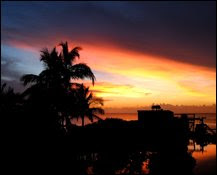A reef ecology graduate class from FSU visited KML to take advantage of a beautiful week of weather here in the Florida Keys. The class was led by Markus Huettel, whose lab's work focuses on the ecology of coastal and shelf environments with emphasis on processes in the sediments and at the sediment-water interface. During their time here at KML they were able to visit a variety of sites, deploying sampling equipment, surveying reef life, and even taking advantage of KML's Living Laboratory. With the help of the KML science staff the Huettel group was able to deploy non-invasive instruments utilizing new techniques to measure vertical oxygen flux at the sea bottom. Vertical oxygen flux is vital in understanding processes such as aerobic decomposition of organic matter, animal respiration, and oxidation processes.
| FSU divers with sampling equipment |
| Deploying oxygen flux measuring equipment |
Of the variety of sites that were visited during the week, Alligator Reef, a favorite of many groups, gave students the opportunity to observe a variety of marine life including the threatened Elkhorn coral, Acropora palmata.
| Acropora palmata at Alligator Reef |
The Huettel Group was able to participate in KML's Living Laboratory which gives student groups a unique opportunity to participate in long term sampling project. Sites are stationed at various permanent locations near the KML facility. The program introduces students to field research in marine ecology utilizing a variety of common sampling techniques. Students are then able to input their data into the KML Living Laboratory data base to contribute to an ongoing data set and compare their findings with previous groups who have participated in the program. For more information on KML's Living Laboratory or how to request participation please visit the "Living Lab" tab on the home page of our website.
FSU student swims transect line back to the boat
|
KML staff orients students on Living Lab
|
Special thanks to Markus Huettel and his team for contributing photos for this post. If you are interested in more information on the work being done by the Huettel Lab at FSU you can visit their website by clicking "here".

